Diagnosed with Lung Cancer and Rectal Cancer: Despair Under Dual Assault
My name is Radik, I am 63 years old, from Kazan, Russia. In October 2022, a routine physical examination dramatically changed my life. The doctor informed me that lesions had been found in both my lungs and intestines. In November, the results of my colonoscopy biopsy indicated adenocarcinoma of the rectum, and in December, a lung biopsy confirmed squamous cell lung cancer. As if life was playing a cruel joke on me; facing one type of cancer was already painful enough, but I was struck by two at the same time. In that moment, I felt an overwhelming sense of despair, as if the entire world were against me.
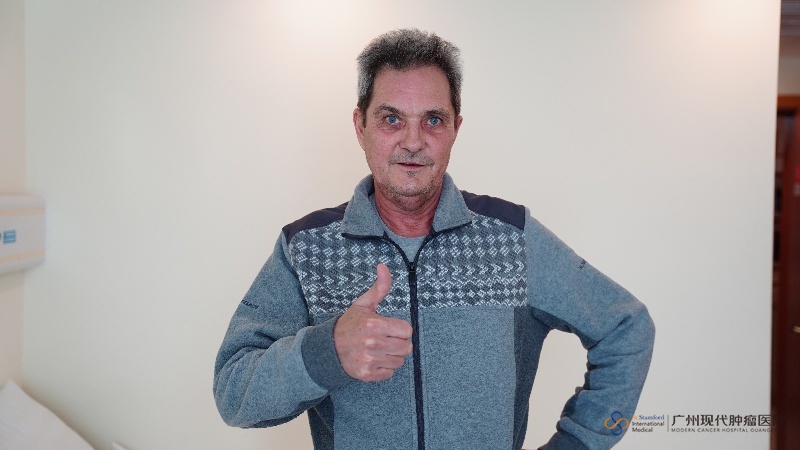
Radik
Seeking Medical Treatment In Places: The Helplessness of Surgical Options
The oncology hospital in Kazan recommended that I undergo surgery to remove 70% of my lung and part of my rectum, followed by a colostomy. This plan was unacceptable to me; the thought of living with a "fecal bag" seemed worse than death. Subsequently, I had to travel to Moscow, hoping to find a better treatment option. I spent about six months shuttling back and forth to Moscow, but I received the same advice: surgical resection. I did not give up on finding an alternative treatment. Later, my son and I flew to Turkey, and after a series of examinations, I received the same treatment recommendations. I felt heavy inside and uncertain about what to do next.
Minimally Invasive Treatment: The Last Hope
Fortunately, by chance, I learned that a friend of my son had received treatment for liver cirrhosis at Guangzhou Modern Cancer Hospital with good results, which gave me a glimmer of hope. With the help of my son’s friend, I reached out to Guangzhou Modern Cancer Hospital. The doctor provided me with a comprehensive introduction to minimally invasive technology, and as if I had found a ray of light in the darkness; I was finally free from despair-inducing terms like "surgery" and "resection." My fear and anxiety were alleviated, leading me to place my hope in this minimally invasive treatment and I decided to travel to China for treatment.
Interventional Treatment Successfully Addresses the Challenges of Dual Primary Cancers
After my admission, I underwent a comprehensive examination and learned that the lesion in the right lower lobe bronchus measured 16 mm*25 mm, which was slightly larger than before. The intestinal lesion measured 78 mm, with a narrowed lumen, and the tumor occupied 5/6 of the intestinal cavity. The surface of the tumor exhibited signs of erosion, ulceration, and bleeding. The doctor told me that the two primary cancers are quite rare, with a probability of only about 2%. Upon my admission, the hospital's specialists promptly convened a joint consultation to discuss my condition and developed an Integrated holistic minimally invasive treatment plan focused on interventional therapy. This therapy involved a 2 mm incision, through which anti-cancer drugs were directly infused into the blood supply artery of the tumor, killing the tumor with fewer side effects compared to systemic chemotherapy. No surgery, no colostomy. I recall that after undergoing two interventional treatments and returning for a follow-up, the doctor informed me that the CT results indicated a reduction in the lesion in the right lower lung lobe, and the colonoscopy revealed a significant decrease in the intestinal tumor. My previously frequent coughing and the presence of blood in my stools had also improved markedly, which completely exceeded my expectations. I am genuinely happy and confident about the upcoming treatments.
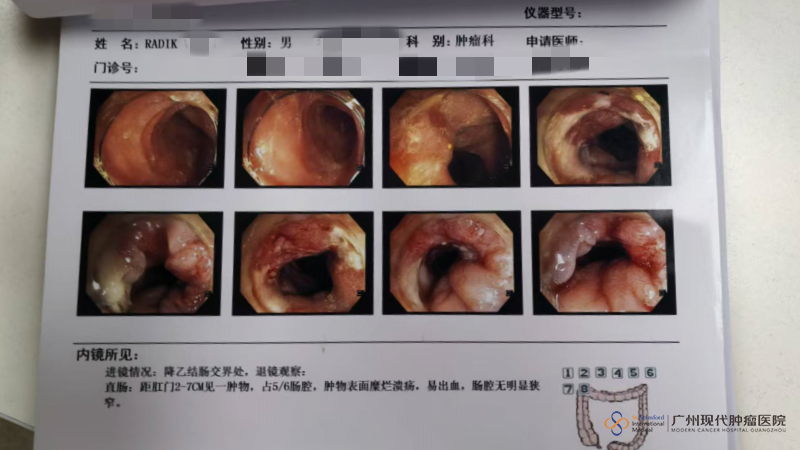
Before intestinal tumor treatment (colonoscopy)
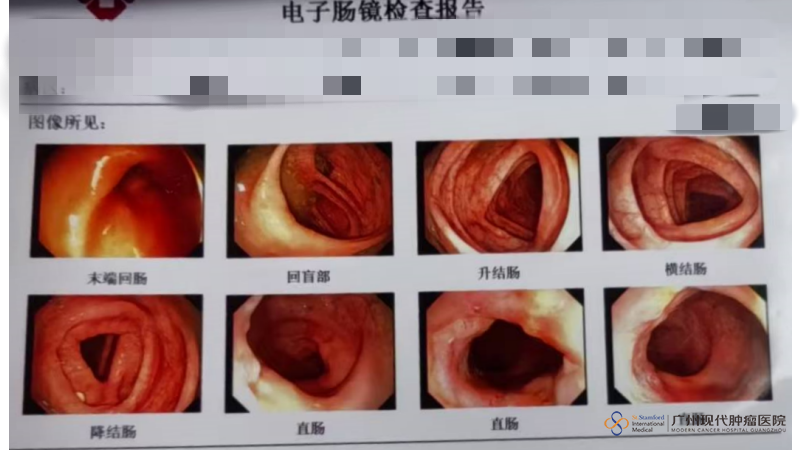
Colonoscopy review after three interventions
The treatment process was not always smooth; there were moments when I wanted to give up. During one session, I experienced complications with very low platelet counts, which put me at risk for internal bleeding and cerebral hemorrhage. At that moment, I thought that rather than enduring the agony of both body and mind, it might be better to simply give up. When I was feeling disheartened and considering abandoning treatment to return home, Dr. Adenan remained steadfast. He and the other medical staff communicated with me patiently, soothing my emotions with unwavering faith and warm words, urging me not to give up easily. Their persistence and care reignited my hope. Meanwhile, the doctors promptly addressed the issue of low platelet counts with targeted treatment, and soon, my platelet levels began to rise. I finally breathed a sigh of relief and resolved to continue with the treatment.
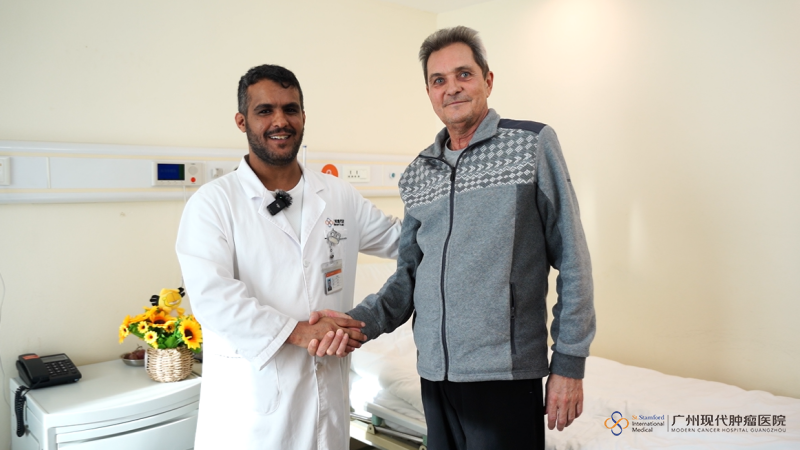
Radik takes a photo with the doctor
As a patient rather than a doctor, I find it challenging to evaluate the advancement of treatment methods and technologies; however, the results of the treatments speak for themselves. During the interventional procedures, I experienced no pain, and my daily life was minimally affected afterward. After 24 hours, I could resume normal activities, eat, and go to the toilet. This is my seventh treatment. The doctor informed me that my lung tumor was nearly completely inactive! Additionally, the tumor in my intestine has shrunk by 90%. Moving forward, I just need to take the medication as prescribed by my doctor and attend regular check-ups. I am very pleased with these results, as they mean I can return to my normal life and work.
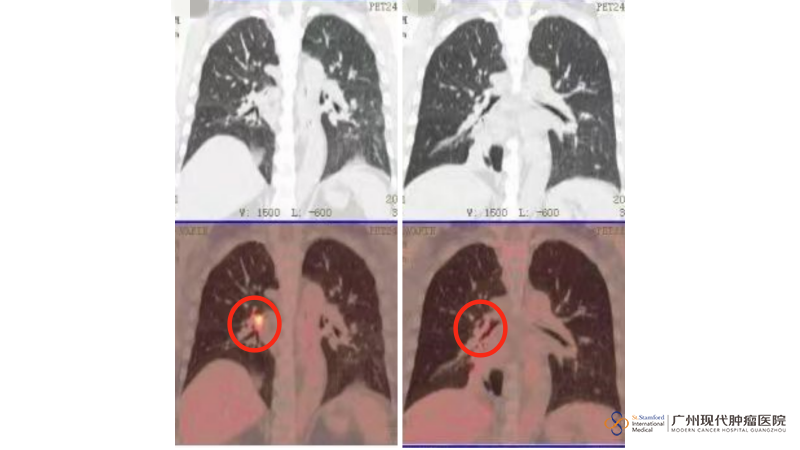
(Left: before treatment, right: after treatment)
Comparison of lung CT scans before and after treatment, lung tumors are basically inactive
Gratitude for All the Support on the Cancer-Fighting Journey
As I've grown older, my memory isn't what it used to be, and sometimes I forget the doctor's instructions as soon as I turn away. Fortunately, my son is always by my side, meticulously communicating and confirming every treatment and medication with the medical staff. I am deeply grateful to him. Whether it was rushing around in Moscow or Turkey, or coming to China for treatment, he has always arranged everything for me, allowing me to focus on my recovery without any worries. At the same time, I would also like to extend my heartfelt thanks to the medical staff at Guangzhou Modern Cancer Hospital. They not only possess exceptional medical skills but also provide meticulous care. During every examination and treatment, they patiently listen to my questions and answer my concerns in detail. Everything about the hospital is impeccable. The translators provided ensure that language is never a barrier to my treatment here. The cleaning staff come daily and change the bed linens regularly, ensuring that I have a clean and tidy hospital environment. For all of this, I can only feel gratitude, and more gratitude!
After returning to my hometown, I shared the good news with my parents. They were surprised by the significant results of my treatment, and their joy was evident. They asked me to extend their gratitude to Dr. Adenan and the other medical staff. I also shared my treatment experience with local doctors, who were equally impressed by the minimally invasive treatment at Guangzhou Modern Cancer Hospital.
I would like to share with others who are battling cancer, like myself, that Guangzhou Modern Cancer Hospital may be a better option. I hope my experience can help more people and inspire others with cancer to actively seek treatment and not relinquish any opportunity for survival. Cancer is daunting, but as long as there is hope, there is a possibility of overcoming it.
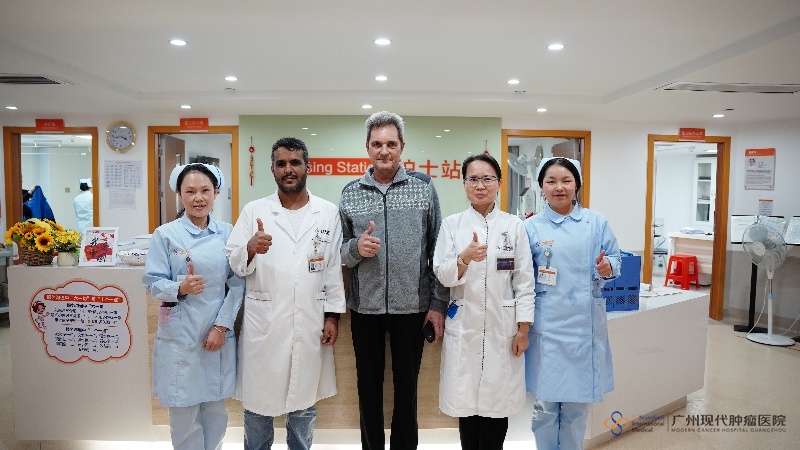
Radik takes a photo with medical staff
*Surgery, in addition to the appropriate chemotherapy and radiotherapy, are effective in treating early cancer, but certain patients in late stage of cancer may not be tolerate surgery well as they can be relatively weak. A combination of carefully planned minimally invasive therapy, chemotherapy or radiotherapy can effectively reduce the side effects and discomfort of treatment and may help patient get better efficacy.













 viber
viber